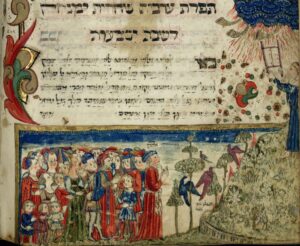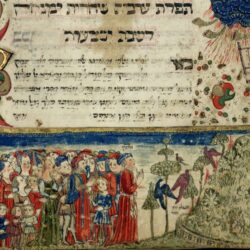This is the sixth and final piyyut of a complete set of yotsrot (piyyutim inserted into the reading of the Shema) in the old Ashkenazi rite, for the Shabbat before Shavuot, including alphabetical gender-neutral translations.
Note: “The CAUSE” is used to translate the Divine Name YHVH, based on the philosophical idea of God as the Prime Mover and on the interpretation of the Name as a causative form of the copula – “causes to be.” This translation also uses the plural pronouns They/Their/Them to refer to God as a pluralis majestatis, and to avoid the implications of God being assigned a gender. (Find Ibn Ezra’s commentary on Genesis 1:1 for a discussion of the pluralis majestatis when referring to God.) All divine referents (pronouns, epithets, names) are rendered in unicase.
| Source (Hebrew) | Translation (English) |
|---|---|
יוֹנָה נְשָׂאתָהּ עַל־כַּנְפֵי נְשָׁרִים וְקִנְנָה בְּחֵיקְךָ בְּחַדְרֵי חֲדָרִים לָמָּה נְטַשְׁתָּהּ נְדוּדָה בַּיְעָרִים וּמִכׇּל־עֲבָרִים פֹּרְשֵׂי מִכְמוֹרִים יְסִיתֽוּהָ זָרִים לֵאלֹהִים אֲחֵרִים וְהִיא בְּמִסְתָּרִים תִּבְכֶּה לְבַֽעַל נְעוּרִים׃ וַתִּשָּׂא אִישׁוֹן לְבַעֲלָהּ הָרִאשׁוֹן וּבֵין אֵֽצֶר וְדִשׁוֹן תַּחֲלִיק לוֹ לָשׁוֹן לָמָּה תַּעֲזֹב נַפְשִׁי לִשְׁאוֹל וְאֵֽדְעָה֙ כִּ֣י אֵ֤ין זוּלָֽתְךָ֙ לִגְא֔וֹל׃ |
You lifted the dove on the wings of eagles, and nested it in Your lap in the innermost chambers. Why have You abandoned her, wandering among the forests? And from all passers-by casting nets, strangers incited to other gods, and she, in the hidden places, cries to the Spouse of her youth. And she raises her pupil to her first Spouse, and between Etzer and Dishon[1] Two sons of Seir the Horite, mentioned in Genesis 36:21. Here representing Christianity and the diaspora as a whole. her tongue slips to Them, For I know that you have no other Redeemer.[2] Ruth 4:4. A repeated refrain throughout the poem. to ask: “Why did you leave my soul? |
הֲלָנֶֽצַח תַּמָּה תְּהִי גְלוּיַת צַמָּה מִזָּה וְשַׁמָּה לְבִזָּה וְשַׁמָּה וּבֶן הָאָמָה בִּעֲתַֽנִי אֵימָה כִּי בְיָד רָמָה קֶֽשֶׁת רָמָה וְאׇהֳלֵי בָמָה לְאׇהֳלִיבָמָה וְאׇהֳלִי בַמָּה תְּיַחֵל עוֹד וְכַמָּה׃ אֵין מֽוֹפֵת וְאֵין אוֹת וְאֵין חָזוּת וּמַרְאוֹת וְאִם אֶשְׁאַל לִרְאוֹת מָתַי קֵץ הַפְּלָאוֹת יַעֲנוּ נְבוּאוֹת הִקְשִֽׁיתָ לִשְׁאוֹל וְאֵֽדְעָה֙ כִּ֣י אֵ֤ין זוּלָֽתְךָ֙ לִגְא֔וֹל׃ |
How could the pure one forever go with hair uncovered?[3] A sign of disgrace, see Numbers 5:18 and the sotah ritual. Mizzah and Shammah[4] Two grandsons of Esau, mentioned in Genesis 36:13 and 17. Here representing Christianity. to shame and disgrace! And the slavegirl’s son[5] Ishmael son of Hagar. Here representing Islam. startled me in fear, for with a high hand he cast the bow.[6] A weapon associated with Ishamel. See Genesis 21:20 And the shrine’s tents[7] An untranslateable pun — “the shrine’s tents” is oholei vama to Oholivama,[8] One of Esau’s wives, see Genesis 36:2. Perhaps referring to the Crusader conquest of Jerusalem. And my tent, how long[9] Another untranslateable pun — “my tent, how long” is oholi va-ma and how much will you wait? There is no wonder, there is no sign, and there is no vision or sight, and were I to ask to see when is the final miracle, prophecies would answer, “You made it hard to ask… for I know that you have no other Redeemer. |
וּבָנוֹת עֲדִינוֹת הׇגְלוּ מִמְּדִינוֹת וּמִמִּטּוֹת רַעֲנַנּוֹת וּמְנוּחוֹת שַׁאֲנַנּוֹת וְנִפְזְרוּ בֵּינוֹת עַם לֹא־בִינוֹת בְּלַעֲגֵי שָׂפָה וּלְשׁוֹנוֹת שׁוֹנוֹת אֵיךְ שׁוֹמְרֵי אֱמוּנוֹת בָּם הָיוּ טְמוּנוֹת וְלֶאֱלִילֵי תְמוּנוֹת אֵין חֶפְצָם לַעֲנוֹת׃ לָמָּה בַּמֶּרְחָק תַּעֲמֹד דָּר שַׁחַק דּוֹדִי רָחַק וְרוֹדִי דָחַק וּלְקֵץ הַיָּמִין נִשְׁאַל נִשְׁאוֹל וְאֵֽדְעָה֙ כִּ֣י אֵ֤ין זוּלָֽתְךָ֙ לִגְא֔וֹל׃ |
Ushered into exile were the gentle daughters from the provinces, and from verdant tribes, and from tranquil resting-places, and they were scattered among people lacking understanding, with alien dialects and strange languages. How could the guardians of faith be buried among them? who have no desire to answer to iconized godlings? Why do You stand afar, o Dweller in the Welkin? My Beloved withdraws, and my subjugator stresses![10] Another untranslateable pun, in this case a spoonerism. “My Beloved withdraws” = dodi raḥaq, while “my subjugator stresses” is rodi daḥaq. For I know that you have no other Redeemer. For the End of Dawes[11] An obsolete Middle English plural of day, to reflect the unique plural form yamin used here, based on the Aramaic-influenced form of Daniel 12:13. we ask, yea, ask! |
דֶּֽגֶל אַהֲבָה מֵעָלַי הוּסַר וְרֶֽגֶל גַּאֲוָה עָלַי עֹל מָסַר וַאֲנִי מְיֻסָּר בְּאַכְזְרִיּוּת מוּסָר גּוֹלֶה וְנֶאֱסָר וּמַר וְזָעֵף וָסָר אֵין מִנְּזָר וְטִפְסָר אֵין מֶֽלֶךְ וְאֵין שָׂר צָר אֵלַי סָר וְצוּר מֶֽנִּי סָר׃ הֶחֱרִיב בְּקִצְפּוֹ מָקוֹם מִדְרַךְ כַּפּוֹ וְהִצִּית בְּזַעְפּוֹ מְזוּזָתוֹ וְסִפּוֹ וְאֵשׁ קָדְחָה בְּאַפּוֹ וַתִּיקַד עַד־שְׁאוֹל וְאֵֽדְעָה֙ כִּ֣י אֵ֤ין זוּלָֽתְךָ֙ לִגְא֔וֹל׃ |
Down came the flag of love from over me, and the prideful foot set a yoke upon me. And I am punished, cruelly removed, an exile and prisoner, and bitter and angry and sullen. There is no crown-prince nor marshal, no king and no noble. The stressor turned towards me, and the Rock turned from me.[12] Another untranslatable pun. “Stressor” = tsar, while “Rock” is tsur. They destroyed in Their fury the place Their sole walks.[13] The Temple. And They ignited in Their anger Their doorpost and Their lintel. And fire fevered in Their rage and kindled unto the underworld. For I know that you have no other Redeemer. |
הַֽ֭לְעוֹלָמִים יִזְנַ֥ח ׀ אֲדֹנָ֑י הַאֵין קֵֽצֶה לְמֽוֹפֵת חֶזְיוֹנָי קוּמָה יְהֹוָה וְיָפֻצוּ שׂוֹטְנָי וְשׁוּב אֶל־מְעוֹנַי אֶל־הֵיכַל לִפְנָי וְהָשֵׁב לִשְׁכֵנַי גְּמֻלוֹת יְגוֹנָי וְתִגָּלֶה לְעֵינַי כְּבֹאֲךָ מִסִּינָי׃ וּבְטַל יֶָשַׁע רֵד עַל־יָרֵא וְחָרֵד וּמִכִּסְאִי הוֹרֵד בֶּן־הָאָמָה מוֹרֵד עַד לֹא־אֵרֵד בְּיָגוֹן אֶל שְׁאוֹל וְאֵֽדְעָה֙ כִּ֣י אֵ֤ין זוּלָֽתְךָ֙ לִגְא֔וֹל׃ |
Always will my Master abandon? Is there no conclusion to my wondrous visions? Arise, Cause, and may my adversaries be scattered, and return to my abodes, to the temple’s midst, and bring upon my neighbors requital for our sorrow, and reveal to my eyes as You came upon Sinai! and with dew of salvation descend upon the reverent and awed, and bring down the rebellious slavegirl’s son[14] Ishmael. Find note above on “the slavegirl’s son.” from my seat, till I no longer descend in sorrow to the underworld, for I know that you have no other Redeemer. |
בִּגְלַל אָבוֹת תּוֹשִׁיעַ בָּנִים וְתָבִיא גְּאֻלָּה לִבְנֵי בְּנֵיהֶם׃ בָּרוּךְ אַתָּה יְהֹוָה גָּאַל יִשְׂרָאֵל׃ |
For the parents’ sake You will save the children and bring redemption to their children’s children. Blessed are You, Cause, who redeemed Israel. |
Notes
| 1 | Two sons of Seir the Horite, mentioned in Genesis 36:21. Here representing Christianity and the diaspora as a whole. |
|---|---|
| 2 | Ruth 4:4. A repeated refrain throughout the poem. |
| 3 | A sign of disgrace, see Numbers 5:18 and the sotah ritual. |
| 4 | Two grandsons of Esau, mentioned in Genesis 36:13 and 17. Here representing Christianity. |
| 5 | Ishmael son of Hagar. Here representing Islam. |
| 6 | A weapon associated with Ishamel. See Genesis 21:20 |
| 7 | An untranslateable pun — “the shrine’s tents” is oholei vama |
| 8 | One of Esau’s wives, see Genesis 36:2. Perhaps referring to the Crusader conquest of Jerusalem. |
| 9 | Another untranslateable pun — “my tent, how long” is oholi va-ma |
| 10 | Another untranslateable pun, in this case a spoonerism. “My Beloved withdraws” = dodi raḥaq, while “my subjugator stresses” is rodi daḥaq. |
| 11 | An obsolete Middle English plural of day, to reflect the unique plural form yamin used here, based on the Aramaic-influenced form of Daniel 12:13. |
| 12 | Another untranslatable pun. “Stressor” = tsar, while “Rock” is tsur. |
| 13 | The Temple. |
| 14 | Ishmael. Find note above on “the slavegirl’s son.” |

“גאולה לשבת לפני שבעות | Geulah piyyut for the Shabbat before Shavuot, by Rabbi Yehuda bar Shmuel he-Ḥasid of Regensburg” is shared through the Open Siddur Project with a Creative Commons Attribution-ShareAlike 4.0 International copyleft license.






Leave a Reply